英语造句句式
最高级the+序数词+最高级+单数名词+范围造句
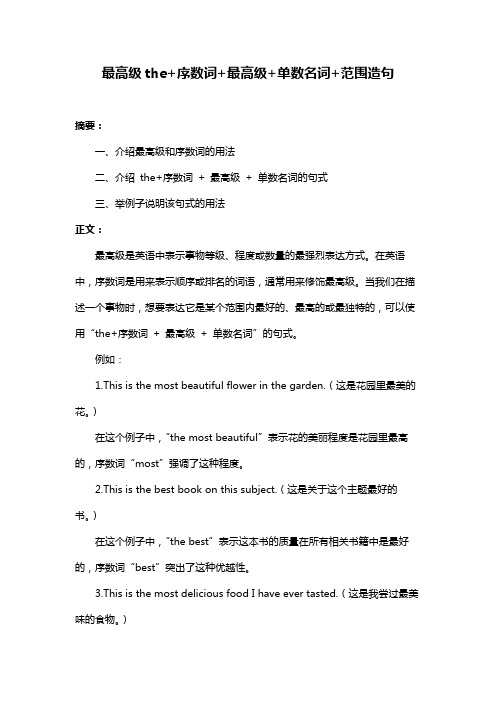
最高级the+序数词+最高级+单数名词+范围造句
摘要:
一、介绍最高级和序数词的用法
二、介绍the+序数词+ 最高级+ 单数名词的句式
三、举例子说明该句式的用法
正文:
最高级是英语中表示事物等级、程度或数量的最强烈表达方式。
在英语中,序数词是用来表示顺序或排名的词语,通常用来修饰最高级。
当我们在描述一个事物时,想要表达它是某个范围内最好的、最高的或最独特的,可以使用“the+序数词+ 最高级+ 单数名词”的句式。
例如:
1.This is the most beautiful flower in the garden.(这是花园里最美的花。
)
在这个例子中,“the most beautiful”表示花的美丽程度是花园里最高的,序数词“most”强调了这种程度。
2.This is the best book on this subject.(这是关于这个主题最好的书。
)
在这个例子中,“the best”表示这本书的质量在所有相关书籍中是最好的,序数词“best”突出了这种优越性。
3.This is the most delicious food I have ever tasted.(这是我尝过最美味的食物。
)
在这个例子中,“the most delicious”表示这食物的味道在我尝过的所有食物中是最好的,序数词“most”强调了这种独特性。
通过这些例子,我们可以看到“the+序数词+ 最高级+ 单数名词”的句式在英语中的用法和表达效果。
英语最常用的60个句型及例句
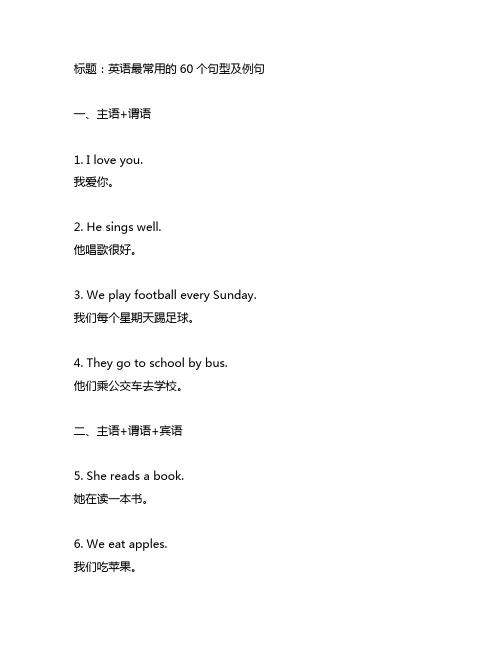
标题:英语最常用的60个句型及例句一、主语+谓语1. I love you.我爱你。
2. He sings well.他唱歌很好。
3. We play football every Sunday. 我们每个星期天踢足球。
4. They go to school by bus.他们乘公交车去学校。
二、主语+谓语+宾语5. She reads a book.她在读一本书。
6. We eat apples.我们吃苹果。
7. He speaks English.他讲英语。
8. They watch TV.他们看电视。
三、主语+谓语+宾语+宾语补足语9. She paints the wall red.她把墙刷成了红色。
10. We call him a hero.我们称他为英雄。
11. He considers the plan unfeasible. 他认为这个计划不可行。
12. They make their father proud.他们让父亲感到自豪。
四、主语+系动词+表语13. I am a teacher.我是一名老师。
14. She was happy.她很快乐。
15. He is my friend.他是我的朋友。
16. They are students.他们是学生。
五、主语+谓语+间宾+直宾17. She teaches us English. 她教我们英语。
18. He bought her a gift. 他给她买了一份礼物。
19. We tell him a story.我们给他讲故事。
20. They show us the way.他们给我们指路。
六、主语+谓语+宾补+宾语21. She made her sister cry.她让她妹妹哭了。
22. They found the problem solved. 他们发现问题已经解决了。
23. He heard the news spread.他听说了消息已经传开了。
五种基本句型英语造句
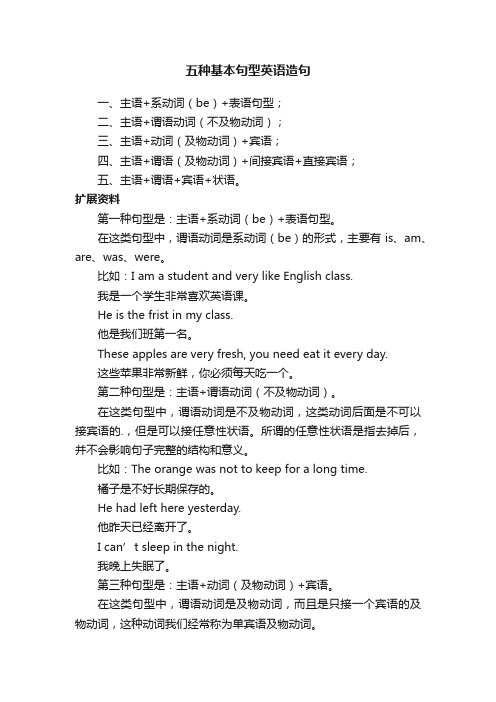
五种基本句型英语造句一、主语+系动词(be)+表语句型;二、主语+谓语动词(不及物动词);三、主语+动词(及物动词)+宾语;四、主语+谓语(及物动词)+间接宾语+直接宾语;五、主语+谓语+宾语+状语。
扩展资料第一种句型是:主语+系动词(be)+表语句型。
在这类句型中,谓语动词是系动词(be)的形式,主要有is、am、are、was、were。
比如:I am a student and very like English class.我是一个学生非常喜欢英语课。
He is the frist in my class.他是我们班第一名。
These apples are very fresh, you need eat it every day.这些苹果非常新鲜,你必须每天吃一个。
第二种句型是:主语+谓语动词(不及物动词)。
在这类句型中,谓语动词是不及物动词,这类动词后面是不可以接宾语的.,但是可以接任意性状语。
所谓的任意性状语是指去掉后,并不会影响句子完整的结构和意义。
比如:The orange was not to keep for a long time.橘子是不好长期保存的。
He had left here yesterday.他昨天已经离开了。
I can’t sleep in the night.我晚上失眠了。
第三种句型是:主语+动词(及物动词)+宾语。
在这类句型中,谓语动词是及物动词,而且是只接一个宾语的及物动词,这种动词我们经常称为单宾语及物动词。
比如:He had left my home yesterday , he can’t tell you.他昨天已经离开我家了,他没有告诉你。
She ate the dinner with her mother.她和她妈妈一起吃的晚饭。
I has left the Beijing by the train.我乘坐火车离开了北京。
第四种句型是:主语+谓语(及物动词)+间接宾语+直接宾语。
英语五大句型例句每种20个例句

英语五大句型例句每种20个例句全文共3篇示例,供读者参考篇1Five major sentence patterns are the foundation of English grammar. By mastering these sentence patterns, learners can effectively communicate in English. Here are 20 examples of each of the five major sentence patterns:1. Subject + Verb1. The dog barks.2. She sings beautifully.3. The sun shines brightly.4. They dance in the rain.5. He runs every morning.6. I read a book.7. We play soccer.8. The cat sleeps.9. John laughs loudly.10. She paints a picture.11. The birds chirp.12. He cooks delicious meals.13. Sarah writes poetry.14. The children laugh.15. The teacher explains the lesson.16. James listens to music.17. Mary dances gracefully.18. They study every night.19. The computer crashes.20. The car drives fast.2. Subject + Verb + Object1. She plays the piano.2. They watch a movie.3. He drinks coffee.4. I eat breakfast.5. The children read books.6. We fly kites.7. The cat chases the mouse.8. I water the plants.9. The students complete the assignment.10. He helps his friends.11. She bakes cookies.12. They clean the house.13. The girl feeds the birds.14. We visit the museum.15. He paints the fence.16. The teacher explains the concept.17. They attend the party.18. I buy groceries.19. She writes a letter.20. He rides a bike.3. Subject + Verb + Complement1. She is happy.2. They are tired.3. He seems angry.4. I feel sick.5. The flowers smell sweet.6. I am a teacher.7. She looks beautiful.8. They appear confused.9. He becomes a doctor.10. It sounds interesting.11. This dish tastes delicious.12. The music sounds relaxing.13. She seems upset.14. He turns red.15. The cake smells wonderful.16. I am hungry.17. They grow tired.18. The weather remains cloudy.19. The movie sounds exciting.20. She feels cold.4. Subject + Verb + Indirect Object + Direct Object1. She gave me a gift.2. They bought him a book.3. I made her a cake.4. He taught us math.5. The waiter brought them the menu.6. I showed him the way.7. She sent me a letter.8. They offered her a job.9. He handed me the keys.10. The doctor prescribed him medication.11. She left me a note.12. They asked her a question.13. I bought them drinks.14. He taught me how to cook.15. The company offered him a promotion.16. She showed them the results.17. They sent us a package.18. I gave her a hug.19. He brought me flowers.20. The teacher assigned them homework.5. Subject + Verb + Object + Complement1. He painted the wall red.2. She made the dress yellow.3. They found the answer correct.4. I consider the decision final.5. The chef named the dish "Spicy Chicken."6. She called the event off.7. We keep the room clean.8. He declared the game won.9. They deemed the project complete.10. The judge pronounced her guilty.11. The teacher labeled the assignment difficult.12. I believe the story true.13. She considers the plan feasible.14. They found the task challenging.15. He painted the house blue.16. She declared the statement false.17. The company named the product "Innovation."18. I thought the movie boring.19. They deemed the movie interesting.20. The chef prepared the dish spicy.By practicing these examples of the five major sentence patterns, learners can enhance their English language skills and communicate effectively in various situations. Mastering these essential structures is a stepping stone towards fluency in English.篇2Five sentence patterns are the basic building blocks of English sentences: SVO (Subject-Verb-Object), SVC(Subject-Verb-Complement), SVI (Subject-Verb-Indirect Object), SVA (Subject-Verb-Adverbial), and SVOO(Subject-Verb-Object-Object). Each pattern serves a specific purpose in sentence structure and helps convey different types of information. Below are 20 examples of each sentence pattern:1. SVO (Subject-Verb-Object):1. The dog chased the cat.2. She bought a new car.3. They ate pizza for dinner.4. He read an interesting book.5. The teacher praised the students.6. I watched a movie last night.7. We visited the museum on Sunday.8. She painted her room blue.9. He fixed the broken window.10. They planted flowers in the garden.11. The cat caught the mouse.12. I baked cookies for the party.13. She wrote a letter to her friend.14. He played basketball with his friends.15. They decorated the house for Christmas.16. The children fed the ducks at the pond.17. She watered the plants in the garden.18. He cleaned the garage on Saturday.19. They hugged each other tightly.20. The chef cooked a delicious meal for us.2. SVC (Subject-Verb-Complement):1. She is a doctor.2. He became a teacher.3. They seem happy.4. The flowers smell sweet.5. The cake tastes delicious.6. She appears nervous.7. He turned pale.8. The movie looks interesting.9. We feel tired.10. They remain friends.11. The dress feels soft.12. He sounded angry.13. She grew taller.14. The water tastes bitter.15. The house looks beautiful.16. The food smells amazing.17. He feels sick.18. The music sounds nice.19. She seems upset.20. The decision remains unchanged.3. SVI (Subject-Verb-Indirect Object):1. I sent her a letter.2. He bought me a gift.3. She baked him a cake.4. They showed us their new house.5. He told me a story.6. I gave her a hug.7. She cooked him a meal.8. They brought me flowers.9. He offered her a ride.10. I showed them the way.11. She read him a book.12. He built me a house.13. They made us laugh.14. I wrote him a song.15. She drew her a picture.16. He taught me a lesson.17. They sang us a song.18. She gave him a kiss.19. I offered her help.20. He bought me a drink.4. SVA (Subject-Verb-Adverbial):1. She sings beautifully.2. He runs fast.3. They speak fluently.4. The car moves slowly.5. He walks carefully.6. She works efficiently.7. They play well.8. I write neatly.9. He listens attentively.10. She speaks softly.11. They study hard.12. I drive safely.13. He sleeps soundly.14. She cooks deliciously.15. They laugh loudly.16. The clock ticks loudly.17. He types quickly.18. The train moves smoothly.19. She dances gracefully.20. They think logically.5. SVOO (Subject-Verb-Object-Object):1. He gave me a book.2. She sent him a letter.3. They showed us their new car.4. I brought him a drink.5. She baked them a cake.6. He taught me a lesson.7. They brought her flowers.8. I showed him the way.9. She read me a story.10. He played them a song.11. I made her a bracelet.12. They bought us a gift.13. She gave him a hug.14. He showed me a picture.15. They sang us a song.16. I cooked him a meal.17. She wrote me a letter.18. He built her a house.19. They offered us help.20. I painted him a picture.By understanding and practicing these five sentence patterns, you can construct a variety of sentences to express different ideas and communicate effectively in English. Remember to mix and match these patterns to create more complex and interesting sentences in your writing and conversation.篇3Title: 20 Examples of Each of the Five Major Sentence Patterns in EnglishIntroduction:In English, there are five major sentence patterns that are commonly used to communicate ideas and information. Thesesentence patterns are essential for building clear and coherent sentences. In this document, we will explore 20 examples of each of the five major sentence patterns to help learners understand how they can be used in different contexts.Pattern 1: Subject + Verb1. She sings beautifully.2. They dance in the rain.3. Mr. Smith teaches mathematics.4. The birds chirp early in the morning.5. The baby sleeps soundly.6. We study English every day.7. The cat meows loudly.8. He drives a red car.9. She reads books in her free time.10. They play soccer after school.11. The flowers bloom in spring.12. I cook dinner for my family.13. The students listen attentively in class.14. The dog barks at strangers.15. We walk in the park on Sundays.16. The sun shines brightly.17. The teacher explains the lesson carefully.18. He runs fast.19. She writes poems in her journal.20. The children laugh happily.Pattern 2: Subject + Verb + Object1. She eats an apple.2. They clean the house every weekend.3. He fixes the car engine.4. The dog chases the cat.5. We visit the museum on Saturdays.6. The boy reads a comic book.7. She paints a beautiful picture.8. They drink cold lemonade.9. The teacher writes on the whiteboard.10. He plays the guitar.11. She waters the plants.12. They watch a movie at the cinema.13. The students solve math problems.14. The chef cooks delicious meals.15. We buy groceries at the supermarket.16. The girl rides her bicycle.17. He mows the lawn.18. She feeds the birds.19. They build a sandcastle at the beach.20. The mechanic fixes the broken machine. Pattern 3: Subject + Verb + Adjective1. She looks stunning in that dress.2. They seem happy today.3. The cake tastes delicious.4. He feels tired after work.5. We sound confident in our presentation.6. The movie seems interesting.7. She appears nervous before the exam.8. They smell the fresh flowers.9. The music sounds soothing.10. He feels proud of his accomplishment.11. She looks beautiful in the morning light.12. The soup tastes spicy.13. The weather seems pleasant today.14. They sound excited about the trip.15. We feel grateful for your help.16. The idea seems feasible.17. He looks handsome with that haircut.18. She feels relieved after talking to her friend.19. The cake tastes sweet.20. They sound enthusiastic about the project. Pattern 4: Subject + Verb + Adverb1. She sings beautifully.2. They dance gracefully.3. He runs quickly.4. The birds chirp cheerfully.5. We study diligently.6. The cat meows loudly.7. She speaks softly.8. They work efficiently.9. The teacher explains clearly.10. He plays the piano skillfully.11. She writes neatly.12. They drive carefully.13. The dog barks loudly.14. We walk briskly.15. The baby sleeps peacefully.16. The children play happily.17. He works diligently.18. She reads aloud.19. They eat quickly.20. The music plays softly.Pattern 5: Subject + Verb + Noun Clause1. She believes that honesty is important.2. They know where the treasure is hidden.3. He thinks that it is a good idea.4. We understand why the decision was made.5. The teacher explains how the experiment works.6. She doubts if he will come to the party.7. They wonder when the train will arrive.8. He realizes that he made a mistake.9. The scientist proves that the theory is correct.10. She knows who stole her wallet.11. They discovered where the secret passage leads.12. We understand why the rules are important.13. The manager explains how the sales strategy will work.14. He believes that hard work leads to success.15. She wonders if it will rain tomorrow.16. They know where the key is hidden.17. The detective suspects that the butler is guilty.18. He understands why she acted that way.19. She believes that love conquers all.20. We understand where the problem lies.Conclusion:Using the five major sentence patterns in English can help create well-structured and clear sentences. By practicing different examples of each pattern, learners can improve their writing and communication skills. It is important to understand how each pattern works and when to use them appropriately. By mastering these sentence patterns, learners can express their ideas effectively and convey their message accurately.。
初中万能句式 英语造句
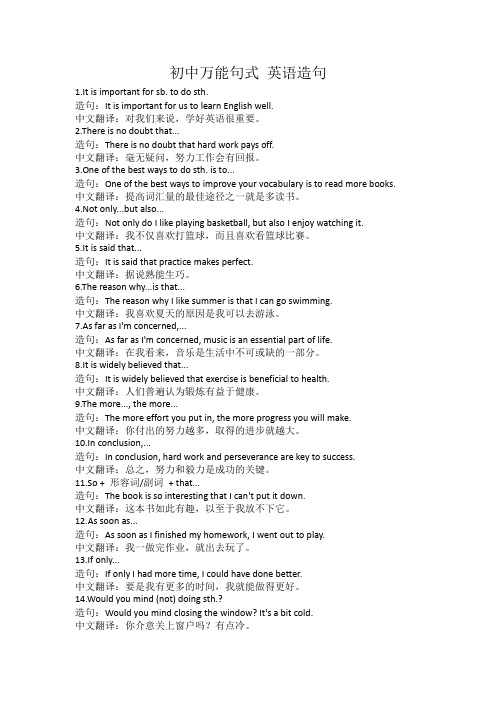
初中万能句式英语造句1.It is important for sb. to do sth.造句:It is important for us to learn English well.中文翻译:对我们来说,学好英语很重要。
2.There is no doubt that...造句:There is no doubt that hard work pays off.中文翻译:毫无疑问,努力工作会有回报。
3.One of the best ways to do sth. is to...造句:One of the best ways to improve your vocabulary is to read more books. 中文翻译:提高词汇量的最佳途径之一就是多读书。
4.Not only...but also...造句:Not only do I like playing basketball, but also I enjoy watching it.中文翻译:我不仅喜欢打篮球,而且喜欢看篮球比赛。
5.It is said that...造句:It is said that practice makes perfect.中文翻译:据说熟能生巧。
6.The reason why...is that...造句:The reason why I like summer is that I can go swimming.中文翻译:我喜欢夏天的原因是我可以去游泳。
7.As far as I'm concerned,...造句:As far as I'm concerned, music is an essential part of life.中文翻译:在我看来,音乐是生活中不可或缺的一部分。
8.It is widely believed that...造句:It is widely believed that exercise is beneficial to health.中文翻译:人们普遍认为锻炼有益于健康。
英语五大基本句型及相应例句

英语五大基本句型及相应例句一、主语 + 谓语1.The cat sleeps.2.She sings beautifully.3.They play football every day.4.He reads books in the library.5.We study English together.二、主语 + 谓语 + 宾语1.Tom eats an apple.2.She writes a letter to her friend.3.They watch a movie on weekends.4.I play the guitar at the party.5.We visit the museum on Sundays.三、主语 + 谓语 + 宾语 + 宾语补语1.She painted the wall blue.2.He considers the book interesting.3.They elected her class president.4.The teacher found his answer correct.5.We named our new puppy Rocky.四、主语 + 谓语 + 地点状语1.She works in a hospital.2.We had lunch at the restaurant.3.They play basketball in the gym.4.He reads books in the park.5.I study English at home.五、主语 + 谓语 + 时间状语1.She wakes up early in the morning.2.They have dinner at 7 p.m.3.He goes to bed late at night.4.We go swimming on Saturdays.5.I visit my grandmother every Sunday.通过以上例句的展示,你可以更好地理解英语中的五大基本句型,希望对你的学习有所帮助。
英语造句公式

英语造句公式
英语造句公式是指一些基本的语法规则,它们能够帮助学习者构建正确的英语句子。
以下是一些常用的英语造句公式:
1. 主语 + 动词:这是最基本的句子结构,主语位于句子的开头,动词紧随其后。
例如:“John runs.”
2. 主语 + 动词 + 宾语:在这种结构中,主语执行动作,宾语是动作的承受者。
例如:“She bought a book.”
3. 主语 + 动词 + 补语:补语通常是形容词或名词,用来描述或重命名主语。
例如:“He seems happy.”
4. 主语 + 动词 + 间接宾语 + 直接宾语:在这种结构中,间接宾语指的是动作的受益者,而直接宾语是动作的承受者。
例如:“I gave him a present.”
5. There + be + 主语 + 宾语:这种结构用来描述某个存在的事物。
例如:“There is a tree in the park.”
以上就是一些基本的英语造句公式,掌握这些规则可以帮助学习者构建正确的英语句子。
- 1 -。
100个英语造句大全
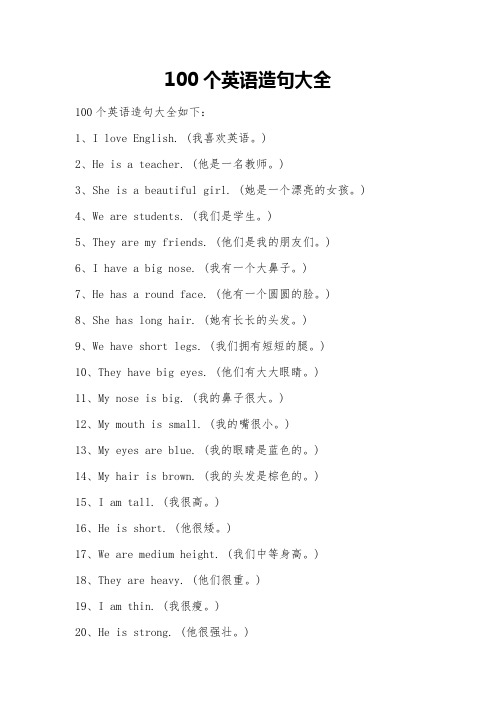
100个英语造句大全100个英语造句大全如下:1、I love English. (我喜欢英语。
)2、He is a teacher. (他是一名教师。
)3、She is a beautiful girl. (她是一个漂亮的女孩。
)4、We are students. (我们是学生。
)5、They are my friends. (他们是我的朋友们。
)6、I have a big nose. (我有一个大鼻子。
)7、He has a round face. (他有一个圆圆的脸。
)8、She has long hair. (她有长长的头发。
)9、We have short legs. (我们拥有短短的腿。
)10、They have big eyes. (他们有大大眼睛。
)11、My nose is big. (我的鼻子很大。
)12、My mouth is small. (我的嘴很小。
)13、My eyes are blue. (我的眼睛是蓝色的。
)14、My hair is brown. (我的头发是棕色的。
)15、I am tall. (我很高。
)16、He is short. (他很矮。
)17、We are medium height. (我们中等身高。
)18、They are heavy. (他们很重。
)19、I am thin. (我很瘦。
)20、He is strong. (他很强壮。
)21、We are medium build. (我们中等身材。
)22、They are all very tall. (他们都很高。
)23、I am 15 years old. (我15岁了。
)24、He is 12 years old. (他12岁了。
)25、We are both 10 years old. (我们都10岁了。
)26、They are all young children. (他们都是小孩儿。
英语造句有哪些基本规则要知道
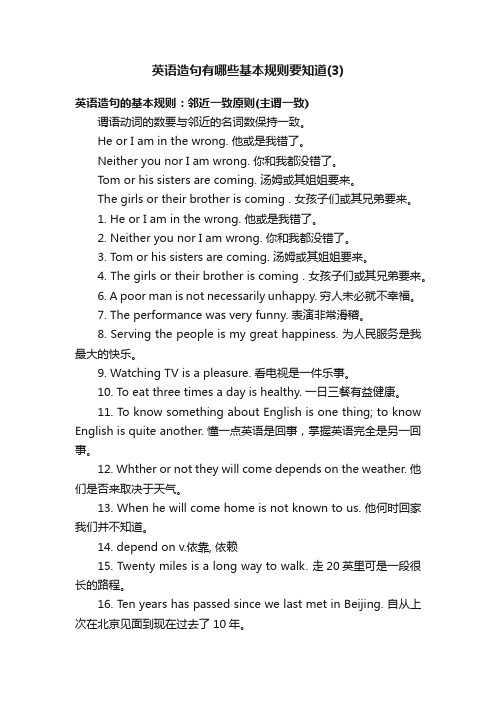
英语造句有哪些基本规则要知道(3)英语造句的基本规则:邻近一致原则(主谓一致)谓语动词的数要与邻近的名词数保持一致。
He or I am in the wrong. 他或是我错了。
Neither you nor I am wrong. 你和我都没错了。
Tom or his sisters are coming. 汤姆或其姐姐要来。
The girls or their brother is coming . 女孩子们或其兄弟要来。
1. He or I am in the wrong. 他或是我错了。
2. Neither you nor I am wrong. 你和我都没错了。
3. Tom or his sisters are coming. 汤姆或其姐姐要来。
4. The girls or their brother is coming . 女孩子们或其兄弟要来。
6. A poor man is not necessarily unhappy. 穷人未必就不幸福。
7. The performance was very funny. 表演非常滑稽。
8. Serving the people is my great happiness. 为人民服务是我最大的快乐。
9. Watching TV is a pleasure. 看电视是一件乐事。
10. To eat three times a day is healthy. 一日三餐有益健康。
11. To know something about English is one thing; to know English is quite another. 懂一点英语是回事,掌握英语完全是另一回事。
12. Whther or not they will come depends on the weather. 他们是否来取决于天气。
13. When he will come home is not known to us. 他何时回家我们并不知道。
英语五种简单句型及例句

英语五种简单句型及例句以《英语五种简单句型及例句》为标题,写一篇3000字的中文文章英语是一种复杂的语言,通过结构简单的句子来表达复杂的思想,已成功地融入到全球交流中。
通过大家熟知的英语五种简单句型,可以更好地掌握英语。
本文简单介绍英语五种简单句型及其例句,让大家更容易理解英语。
首先,陈述句(Declarative Sentence)以叙述的方式提出一个观点,而其他种类的句子则用于提出请求,表达感受或提出一个问题。
以下是例句:1、The cat is sleeping on the sofa.(猫在沙发上睡觉。
)2、I love music.(我喜欢音乐。
)3、She is a doctor.(她是一名医生。
)其次,疑问句(Interrogative Sentence)用于询问一个问题,由“帮助动词”与主语及动词上的谓语(verb phrase)组成。
以下是例句:1、Do you like music?(你喜欢音乐吗?)2、Are you a teacher?(你是老师吗?)3、What is your name?(你叫什么名字?)第三,感叹句(Exclamatory Sentence)一般用来表达强烈的情绪,由“what”或“how”、感叹词和主语和动词上的谓语(verb phrase)组成。
以下是例句:1、What a beautiful day!(多么美好的一天!)2、How long is the bridge!(这桥有多长!)3、How exciting the game is!(这场比赛多高兴!)继而,祈使句(Imperative Sentence)用于表达请求或命令,祈使句只有动词组成,没有主语,暗含主语为“you”,以实现某项行动。
以下是例句:1、Come here.(来这里。
)2、Please give me a hand.(请帮我一把。
)3、Let go.(走吧。
)最后,选择性句(Choice Sentence)用于提出两个或两个以上的选择选项,来表达选择的决定。
英语五大句型例句每种20个例句
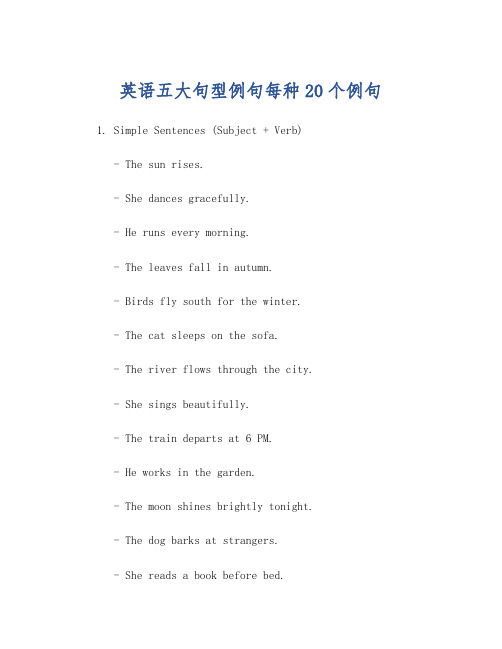
英语五大句型例句每种20个例句 1. Simple Sentences (Subject + Verb)- The sun rises.- She dances gracefully.- He runs every morning.- The leaves fall in autumn.- Birds fly south for the winter.- The cat sleeps on the sofa.- The river flows through the city.- She sings beautifully.- The train departs at 6 PM.- He works in the garden.- The moon shines brightly tonight.- The dog barks at strangers.- She reads a book before bed.- The wind blows gently.- He swims in the ocean.- The flowers bloom in spring.- She cooks dinner for the family.- The car accelerates quickly.- He walks to the store.- The rain falls softly.- The clock ticks loudly.2. Compound Sentences (Subject + Verb + Object) - I read a book about history.- She enjoys eating chocolate.- He plays the piano every evening.- They watch movies on weekends.- The children love playing in the park.- She hates getting up early.- He studies hard for his exams.- The birds eat seeds from my hand.- She listens to music while working.- The teacher assigns homework daily.- He buys groceries on his way home.- The students write essays for class.- She chooses a red dress for the party.- He catches the ball with ease.- The dog fetches the stick.- She opens the door for me.- The wind carries the scent of flowers.- He finds joy in helping others.- The waves crash against the shore.- She paints a picture of the sunset.- The children receive gifts for Christmas.3. Complex Sentences (Subject + Verb + Object +Subordinate Clause)- I will call you when I arrive.- She will be happy if you visit her.- He is reading a book that I recommended.- The cat sleeps where it's warm.- The students will pass the test if they study. - She sings loudly because she is excited.- He is a great athlete despite his age.- The flowers bloom when the weather is warm.- She cooks dinner while the children play.- The train is late because of the storm.- He will succeed if he works hard.- The moon is bright even though it's cloudy.- The dog barks whenever it hears a noise.- She smiles because she is happy.- The wind blows harder as the storm approaches.- He swims faster than anyone else in the team.- The flowers wilt after the rain.- She cries because she is sad.- The car stops when the light turns red.- He feels proud because he finished the race.4. Compound-Complex Sentences- I will call you after I finish my work, and then we can go out for dinner.- She enjoys painting and often spends her weekends in the studio.- He plays the guitar, and his brother plays the drums.- The children play outside, but they come in whenit's dark.- She hates getting up early, so she sets her alarmfor the latest possible time.- He studies hard for his exams, and as a result, he always gets good grades.- The birds eat seeds from my hand, which is why theycome to my garden.- She listens to music while working, and it helps her concentrate.- The teacher assigns homework daily, but the students still enjoy their classes.- He buys groceries on his way home, and he always picks up something special for me.- The students write essays for class, and they learn a lot from the process.5. Sentences with Non-Finite Verbs (Gerunds and Infinitives)- Reading is a great way to relax.- She loves playing the violin.- He stopped to admire the view.- The children enjoy playing games.- I prefer watching movies to reading books.- She hates being woken up early.- He dreams of traveling the world.- The cat dislikes being disturbed while sleeping.- She stopped to listen to the music.- The students are excited about learning new things. - He is good at solving complex problems.- The flowers need watering regularly.- She is considering changing her career.- He is capable of achieving great things.- The dog is trained to fetch the ball.- She is fond of collecting stamps.- The wind is strong enough to move the leaves.- He is interested in learning a new language.- The children are eager to start their summer vacation.。
英语五大句型例句每种20个例句
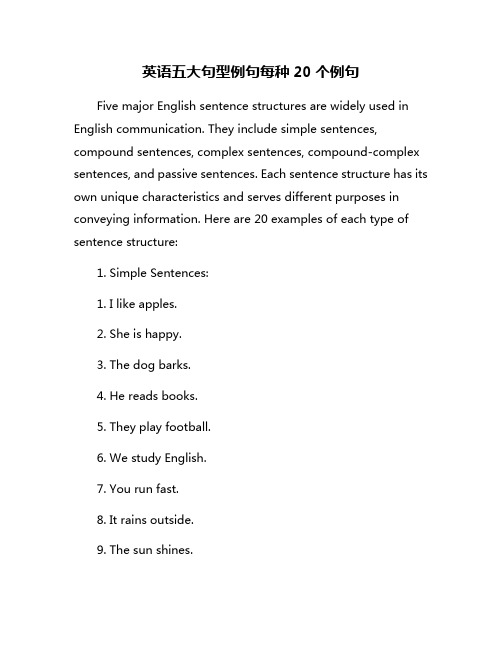
英语五大句型例句每种20个例句Five major English sentence structures are widely used in English communication. They include simple sentences, compound sentences, complex sentences, compound-complex sentences, and passive sentences. Each sentence structure has its own unique characteristics and serves different purposes in conveying information. Here are 20 examples of each type of sentence structure:1. Simple Sentences:1. I like apples.2. She is happy.3. The dog barks.4. He reads books.5. They play football.6. We study English.7. You run fast.8. It rains outside.9. The sun shines.10. She sings well.11. He eats rice.12. The cat sleeps.13. It is cold.14. They dance gracefully.15. We go to school.16. He works hard.17. She paints pictures.18. The bird flies.19. They laugh loudly.20. The plants grow quickly.2. Compound Sentences:1. I like coffee, but she prefers tea.2. He is tall, yet she is short.3. They went shopping, and then they had lunch.4. I studied hard, yet I failed the exam.5. She is smart, so she always gets good grades.6. He works in the morning, and he goes to the gym in the evening.7. They played basketball, and they won the game.8. She reads books, but she doesn't like novels.9. He is tired, yet he keeps working.10. They sang a song, and they danced.3. Complex Sentences:1. Even though it was raining, we went for a walk.2. She studied hard because she wanted to pass the exam.3. He is happy when he is with his friends.4. I will go to the store after I finish my homework.5. They could not play outside since it was raining.6. She got up early so that she could catch the bus.7. Although he was tired, he stayed up late to finish his project.8. I will go to the beach if the weather is nice.9. She is happy because she got a new job.10. He sings well, even though he is shy.4. Compound-Complex Sentences:1. She studied hard, but she still failed the exam because she did not understand the material.2. Although it was cold outside, they decided to go for a hike, and they enjoyed the fresh air.3. He is busy with work, yet he finds time to spend with his family when he can.4. She went to the store to buy groceries, but she forgot her wallet at home, so she had to walk back to get it.5. Even though it was late, they continued to work on the project, and they finished it before the deadline.6. He is a good student, but he struggles with math, so he has to get extra help.7. She went for a run, and she felt great afterwards, but she twisted her ankle in the process.8. Although he wanted to go to the party, he had to stay home to take care of his sick sister.9. They went to the concert, but they arrived late, so they missed the opening act.10. She loves to cook, so she took a class, and now she is a skilled chef.5. Passive Sentences:1. The cake was eaten by the children.2. The letter was written by Mary.3. The book was read by John.4. The window was broken by the ball.5. The house was built by the architect.6. The car was stolen last night.7. The picture was painted by the artist.8. The movie was watched by millions of people.9. The story was told by the teacher.10. The cake was baked by my mom.11. The clothes were washed by the laundry service.12. The decision was made by the committee.13. The match was won by the underdog team.14. The project was completed on time.15. The song was sung beautifully by the singer.16. The mistake was made by me.17. The job offer was accepted by him.18. The cake was decorated by the baker.19. The problem was solved by the team.20. The painting was hung on the wall.In conclusion, mastering these five major English sentence structures will greatly enhance your ability to communicate effectively in English. Understanding how to use each type of sentence structure appropriately will help you express your thoughts clearly and concisely. Practice using these examples in your everyday conversations, writing, and presentations to improve your English language skills.。
英语十个造句
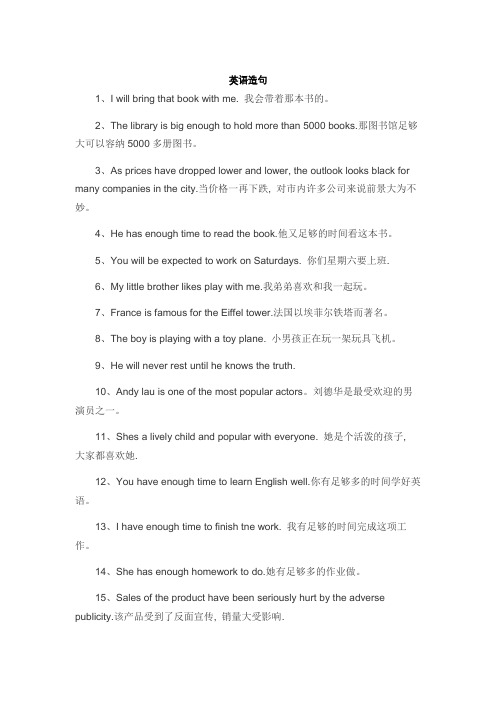
英语造句1、I will bring that book with me. 我会带着那本书的。
2、The library is big enough to hold more than 5000 books.那图书馆足够大可以容纳5000多册图书。
3、As prices have dropped lower and lower, the outlook looks black for many companies in the city.当价格一再下跌, 对市内许多公司来说前景大为不妙。
4、He has enough time to read the book.他又足够的时间看这本书。
5、You will be expected to work on Saturdays. 你们星期六要上班.6、My little brother likes play with me.我弟弟喜欢和我一起玩。
7、France is famous for the Eiffel tower.法国以埃菲尔铁塔而著名。
8、The boy is playing with a toy plane. 小男孩正在玩一架玩具飞机。
9、He will never rest until he knows the truth.10、Andy lau is one of the most popular actors。
刘德华是最受欢迎的男演员之一。
11、Shes a lively child and popular with everyone. 她是个活泼的孩子,大家都喜欢她.12、You have enough time to learn English well.你有足够多的时间学好英语。
13、I have enough time to finish tne work. 我有足够的时间完成这项工作。
14、She has enough homework to do.她有足够多的作业做。
英语造句带翻译的

英语作为一门全球通用的语言,在国际交流中起着举足轻重的作用。掌握好英语造句的能力对于英语学习者来说至关重要。本文将介绍一些常见的句式,并附上它们的中文翻译,帮助大家更好地理解和运用。
一、陈述句
1. I am a student.(我是一名学生。)
2. She likes reading books.(她喜欢读书。)
3. I will call you as soon as I arrive.(我一到就给你打电话。)
4. Please let me know if there is anything I can help with.(如果有什么需要我帮忙的,请告诉我。)
5. He studies hard so that he can get a good grade.(他努力学习,以便能取得好成绩。)
2. How amazing the magic show is!(这个魔术表演太神奇了!)
3. What a lovely baby!(多可爱的宝宝啊!)
4. How delicious the cake tastes!(这蛋糕真好吃!)
5. What a sunny day it is!(今天多么阳光明媚的一天啊!)
通过以上的例句,我们可以看到不同类型的句子在英语中的应用。在学习英语时,熟练掌握造句的技巧和规则是非常重要的。只有通过大量的练习,才能在实际运用中做到游刃有余。希望以上内容能对大家的英语学习有所帮助!
五、复合句
1. We will go to the park if the weather is g playing the piano because it makes her feel relaxed.(她喜欢弹钢琴,因为那能让她感到放松。)
主谓宾状结构的句子英语
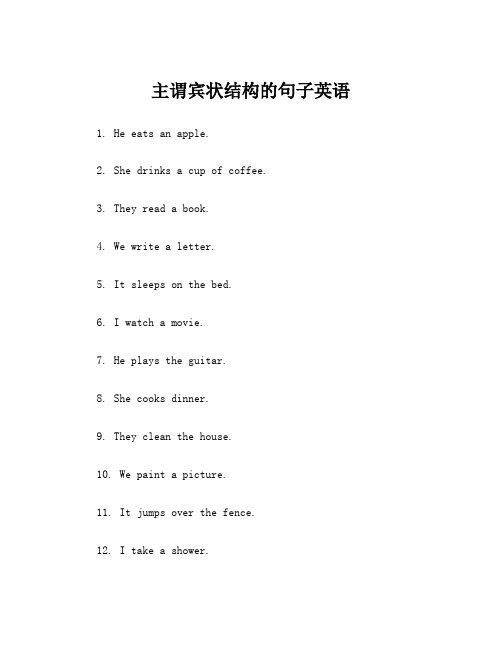
主谓宾状结构的句子英语1. He eats an apple.2. She drinks a cup of coffee.3. They read a book.4. We write a letter.5. It sleeps on the bed.6. I watch a movie.7. He plays the guitar.8. She cooks dinner.9. They clean the house.10. We paint a picture.11. It jumps over the fence.12. I take a shower.13. He rides a bike.14. She sings a song.15. They plant flowers.16. We bake a cake.17. It flies in the sky.18. I go for a walk.19. He studies for the exam.20. She feeds the cat.21. They swim in the pool.22. We build a sandcastle.23. It barks at the stranger.24. I take a photo.25. He fixes the car.26. She runs a marathon.27. They dance at the party.28. We play soccer.29. It chases its tail.30. I buy a new dress.31. He gives a speech.32. She solves a puzzle.33. They solve a mystery.34. We find a treasure.35. It catches a fish.36. I draw a picture.37. He lifts weights.38. She writes a poem.39. They catch a butterfly.40. We go on a picnic.41. It hides under the bed.42. I make a sandwich.43. He invents a new gadget.44. She designs a logo.45. They discover a new planet.46. We climb a mountain.47. It stings the bee.48. I create a piece of art.49. He cooks breakfast.50. She sings a lullaby.51. They win the championship.52. We plant a tree.53. It digs a hole.。
英语五个基本句型的例句
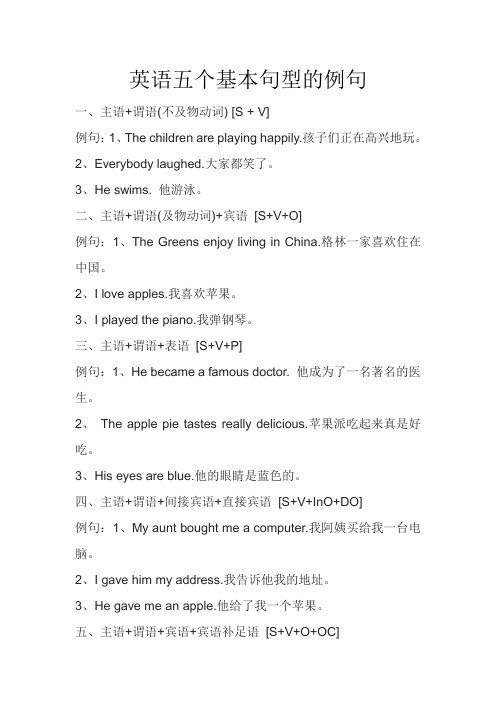
英语五个基本句型的例句
一、主语+谓语(不及物动词) [S + V]
例句:1、The children are playing happily.孩子们正在高兴地玩。
2、Everybody laughed.大家都笑了。
3、He swims. 他游泳。
二、主语+谓语(及物动词)+宾语[S+V+O]
例句:1、The Greens enjoy living in China.格林一家喜欢住在中国。
2、I love apples.我喜欢苹果。
3、I played the piano.我弹钢琴。
三、主语+谓语+表语[S+V+P]
例句:1、He became a famous doctor. 他成为了一名著名的医生。
2、The apple pie tastes really delicious.苹果派吃起来真是好吃。
3、His eyes are blue.他的眼睛是蓝色的。
四、主语+谓语+间接宾语+直接宾语[S+V+InO+DO]
例句:1、My aunt bought me a computer.我阿姨买给我一台电脑。
2、I gave him my address.我告诉他我的地址。
3、He gave me an apple.他给了我一个苹果。
五、主语+谓语+宾语+宾语补足语[S+V+O+OC]
例句:1、We must keep our school clean.我们必须保持我们的学校清洁。
2、I found the box empty.我发现盒子是空的。
3、I find the clock broken.我看到钟表坏了。
(完整版)精选主谓宾英语造句
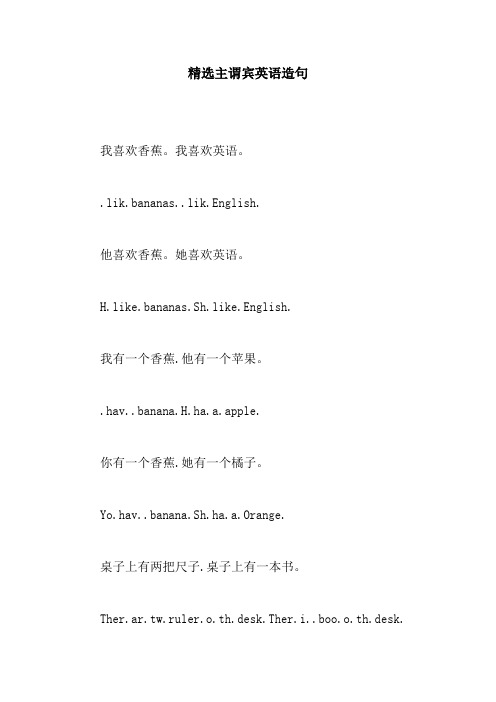
精选主谓宾英语造句我喜欢香蕉。
我喜欢英语。
.lik.bananas..lik.English.他喜欢香蕉。
她喜欢英语。
H.like.bananas.Sh.like.English.我有一个香蕉.他有一个苹果。
.hav..banana.H.ha.a.apple.你有一个香蕉.她有一个橘子。
Yo.hav..banana.Sh.ha.a.Orange.桌子上有两把尺子.桌子上有一本书。
Ther.ar.tw.ruler.o.th.desk.Ther.i..boo.o.th.desk.书包里有两本书.文具盒里有一支铅笔。
Ther.ar.tw.ruler.i.th.bag.Ther.i..penci.i.th.pencil-box .教室里有个黑板.动物园里有猴子和大象。
Ther.i..blackboar.Ther.ar.monkey.an.elephant.i.th.zoo.兔子有耳..图书馆里有很多书。
Th.rabbi.ha.ear.Ther.ar..lo.o.boo.i.th.library;猫有眼.教师桌上有本英语书。
ther.i.a.Englis.boo.o.th.teacher'.desk.Th.ca.ha.eyes我有新的书包。
我洗手。
.hav..ne.schoolbag..was.m.hand。
我洗脸.他读书。
.was.m.fac..H.read.books.她说英语.他做作业。
Sh.speak.English.H.doe.hi.homework. 主系表:am/is/are我是迈克.我的名字是迈克。
I’’.Mike.我是一位学生。
我是一位老师。
I’..’..teacher.我是一位男孩。
I’..boy.你是迈克。
Yo.ar.Mike.你是一位学生。
Yo.ar..student. 你是一位男孩。
Yo.ar..boy.他是迈克。
H.i.Mike.他是一位学生。
H.i..student.他是一位男孩。
英语五大句型例句每种20个例句

英语五大句型例句每种20个例句1. 主语 + 谓语•She dances gracefully.•The cat meows loudly.•They laughed at the joke.•He plays the guitar.•The sun shines brightly.2. 主语 + 谓语 + 宾语•She reads a book.•They built a sandcastle.•He bought a new car.•The teacher explained the lesson.•I ate an apple.3. 主语 + 谓语 + 补语•She is a doctor.•He seems happy.•They made him the captain.•The house looks beautiful.•The ice cream tasted sweet.4. 主语 + 谓语 + 宾语 + 宾补•I painted the wall blue.•She called him a liar.•They named the baby Alice.•He considers her his best friend.•We found the job easy.5. 主语 + 谓语 + 宾语 + 地点状语•She reads in the library.•They played soccer at the park.•He slept on the couch.•The bird flew over the tree.•We had dinner in a restaurant.以上是英语五大句型的一些例句,不仅可以帮助你学习句型结构,还可以丰富你的英语表达方式。
希望这些例句对你的学习有所帮助!。
- 1、下载文档前请自行甄别文档内容的完整性,平台不提供额外的编辑、内容补充、找答案等附加服务。
- 2、"仅部分预览"的文档,不可在线预览部分如存在完整性等问题,可反馈申请退款(可完整预览的文档不适用该条件!)。
- 3、如文档侵犯您的权益,请联系客服反馈,我们会尽快为您处理(人工客服工作时间:9:00-18:30)。
abandonv.放弃,中止;抛弃。
例:Abandoned dogs often turn into handsome and horny men after being taken in by kind boys.被善良小受捡回家的弃犬通常会变身为饥渴帅小攻。
abatev.减弱;趋缓。
例:The panic purchase of H doujinshi shows no sign of abating.对8CJ同人志的疯狂抢购丝毫没有减缓的趋势。
abbreviatev.缩写;缩短,删节。
例:Because of explicit H scenes, her BL novel had to be abreviated before it hit the market.她的小说太不CJ,导致部分内容在出书前被河蟹鸟。
abductv.绑架。
例:Koji's brothers abducted Izumi in order to break up the love birds.晃司的哥哥们棒打鸳鸯,绑架了泉。
aberrationn.反常的事或举动。
例:In a moment of aberration, he almost agreed to let the younger man move in with him.他一时糊涂,差点答应让那小子搬进来一起住。
abhorv.憎恶,憎恨。
例:Thou shall abhor the ignorant and self-centered lolis.汝当憎恶无知自大的LOLI。
abidev.容忍,遵守;居留,逗留。
例:Thou shall not abide the authors' laziness.汝不可忍耐作者的懒惰。
abnormaladj.不正常的。
例:There's nothing abnormal about girls who enjoy watching two men getting it on.女孩子爱看俩爷们搅基也没啥不正常。
abolishv.(依法)废除?例:The restrictions on BL novels and mangas had been abolished a long time ago.禁BL小说漫画的规定早就被废除了。
abortv.中止;流产,堕胎。
例:He is very weak from last week's abortion.他上周刚小产,身子虚得很。
abrasionn.磨损;擦伤。
例:It seems that they played it rough last night, there are some abrasions on his wrist.两人昨晚打得火热,他的手腕都被磨伤了。
abruptadj.突然的;粗鲁的,无礼的。
例:He penetrated him abruptly.他毫无预警地贯穿了他。
absencen.缺席;不存在,缺乏。
例:It was the absence of normal body contact which made me aware of what's going on.他们竭力躲避身体接触,反而让我嗅到了JQ的味道。
absoluteadj.完全的,纯粹的;绝对的;专制的。
例:His knees grew weak from the absolute pleasure brought by the other man.那男人带来的欢愉让他膝盖发软。
absolvev.免责,赦免。
例:No one can absolve him from his sins, for his forbidden love is firm and strong.这份禁断之爱坚如磐石,没人能赦免他的罪。
absorbv.吸收;获取;吞并。
例:Male fox demons can absorb energy from men, too.公狐狸精也能从男人那儿吸取精气。
abstractadj.抽象的;抽象派的。
n.摘要;抽象派作品。
v.摘录,总结。
例:Some authors use a lot of abstract adjectives in their works, I had to read the story twice to know what the characters are doing.有些作者抽象形容词用得太多,我得看两遍才能弄明白人物都在干嘛。
absurdadj.愚蠢的;荒谬的。
例:Hey Harry, check it out! Some muggles think you and Malfoy fit for each other! How absurd!嘿,哈利!有群麻瓜觉得你和马尔福很般配!真奇怪!acquiesce v.(勉强)同意,(不情愿地)默许。
例:Lowering his head and biting his lip, he acquiesced the other man's plea to bed with him.低着头,咬着唇,他勉强应允了男人的求欢。
acquirev.得到,获得。
例:After she became a slasher, she acuired a good knowledge of male physiology.成为腐女之后,她学到了不少男性生理学的知识。
acquitv.宣判无罪。
例:The judge acquitted him of sodomy.法官免除了他插菊花的罪名。
adeptadj.擅长的,精通的。
例:As much as you may dislike him, you've got to admit, he is very adept at the art of potion brewing.不管多不喜欢他,你得承认,制作魔药他可是技艺精湛。
adequateadj.足够的,适当的。
例:Is your stock adequate for the Harmonic Era?你的库存能撑过河蟹时期么?adherev.紧紧粘着;坚持;遵守。
例:Shindo adheres to Yuki like a remora adheres to a shark.新堂粘由贵,就像鮣鱼粘鲨鱼。
adjacentadj.邻近的。
例:There are many scary places adjacent to XQ, where even slashers fear to tread.XQ附近雷区多,连腐女也望而却步。
(英有俗语“where angels fear to tread”)adjournv.暂停(会议、审讯等),延期。
例:The midnight meetings will be adjourned until the Harmonic Era is over.河蟹时期,午夜场暂时休场。
adjustv.调整;适应。
例:The new generation of Vibrater Vital products can automaticly adjust toyour needs.新一代的非它不可牌震动器可以根据您的需要,自动调节形状及大小。
administerv.管理;给予。
例:XQ people's anger outburst administered a strong blow to HY's reputation and popularity.XQ民愤激昂有如火山爆发,大大打击了HY的名声和人气。
admirev.钦佩;欣赏。
例:Dean took his time to adminre himself in the rearview mirror, and then gave a whistle: "Ain't you a handsome looking guy!"迪恩对着后视镜臭美了好一会儿,吹口哨道:“你可真是个帅小伙!”admitv.承认;认同;准许…进入。
例:They were both too stubborn to admit that they love each other.他俩一样固执,都不肯承认自己爱着对方。
admonishv.告诫,警告。
例:The author was admonished for not updating her work.该作者因为挖坑不填而受到警告。
adolescentn.青少年。
adj.青春期的。
例:In ancient Greek, wise and respectable men's favour for adolescent boys was highly praised.在古希腊,智慧而尊贵的男人对年轻男孩的宠爱是被赞赏的。
adoptv.领养;采取;选择。
例:If you are a clumsy but good looking single dad, please beware of your adopted son.假如您是位笨手笨脚却貌似天仙的单身爸爸,请小心防备您的养子。
adorev.宠爱;崇拜;爱戴。
例:When he was just a little boy, he used to adore his older brother as if he was God.他小时候把哥哥当成神一样崇拜。
adulteratev.掺假。
例: He was arrested for selling adulterated aphrodisiacs.他卖掺假的X药,结果被逮进去了。
advancen.进展;前进;预支。
v.进展;前进,推进;提前;预付;提出(建议)。
adj.预先的,之前的。
例:From rookie to pro, Hikaru adanced greatly under Sai's guidance and Akira's pressure.在佐为的指导与小亮的压力下,光仔进步神速,从菜鸟成长为专业棋手advantagen.优势;好处。
例:Isn't it weird? He took physical advantage of the boss and didn't get sacked!他吃了老板的豆腐却没被开除,难道不奇怪吗?adventn.出现,被广泛使用。
例:The advent of the new particle caused dramatic changes in the war.新粒子的大规模使用给战争带来了戏剧性的变化。
